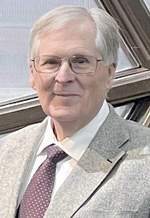Editor’s note: This column was updated at 5:22 p.m. on Saturday, March 12 to remove a paragraph that referred to statements made by Professor Michael Rectenwald, Chief Academic Officer for American Scholars.
By RAY ADLER
Ask Adler
 What is happening with the World Economic Forum (WEF)? (weforum.org)
What is happening with the World Economic Forum (WEF)? (weforum.org)
This organization is based in Geneva, Switzerland, and hosts an annual conference in Davos, Switzerland, to “engage the foremost political, business, cultural and other leaders of society to shape global, regional, and industry agendas.” A thinly veiled attempt to centralize power and influence among large corporations and global elites.
The WEF was originally founded as the European Management Forum in 1971, which focused on “how European firms could catch up with US management practices.” The World Economic Forum, however, is founded on the controversial stakeholder theory of business, which posits that an organization or business is accountable “to all parts of society” and must consider a broad range of interests, including employees, its community, and the government prior to acting. Under traditional, capitalist notions of business, a business is accountable to its shareholders (owners) and operates to maximize profits for said shareholders. For example, when you purchase shares of Starbucks, it is under an obligation or duty to maximize the value of the shares you purchased. Starbucks’ job is to be profitable and make you money.
The stakeholder theory of business broadens the obligation beyond the shareholder to include stakeholders. Key proponents of the stakeholder theory include Elizabeth Warren and Bernie Sanders.
One of the problems with the stakeholder theory is that “stakeholder” is typically not clearly defined. Using our Starbucks example, who is a stakeholder? An employee? A customer? An individual on the other side of the globe? What about an endangered animal? Moreover, if more than one group of stakeholders exist, isn’t it likely that competing interests among stakeholders will arise? How then is the business to determine which interest is most important?
Further, at a rudimentary level, the stakeholder theory faces serious questions of sustainability. How long can a firm that prioritizes the interests of stakeholders over profits stay in business? More important, who will invest in such a firm knowing that it may not see a return on their investment or, worse yet, lose their investment altogether?
It appears that WEF’s ultimate goal is to reset the world’s economic framework. WEF promotes its transformative ideology as a response the COVID-19 pandemic and climate change. Some call the stakeholder theory corporate socialism or communist capitalism. The implementation of such a system would likely lead to fewer corporations controlling greater amounts of the capital because smaller business would be unable to absorb the finical burden. Presumably, these ultra-corporations would be subject to increased top-down government control, much like the current Chinese regime.
If the WEF achieves its mission, our nation’s economic dominance will end. Energy will be unaffordable and shipped in from faraway lands. Healthcare will be abysmal. And consumption of traditional sources of protein will be greatly diminished.
Currently, values that built the West are being tested to their breaking point. Be aware and be informed. Global elitism and centralization can be rebuked and rejected by a people who understand the principles and price of freedom. Ours is a stubborn country and it does not take well to being told what to do.
Educational material and not legal advice, written by the team at Adler attorneys. Email andrea@noblesvilleattorney.com with questions or comments.

And thus the quandary presented regardless if one believes ( or doesn’t ) that climate change is the most significant threat to life going forward ( the defense department does )
No one, wealthy nations or those aspiring to be wealthy, would agree to a lowering of their current standard of living, completely understandable as a component of human nature.
So it’ll be a can kicked down the road to the next generation, and the next, & the next.
Until .. arable land, potable water & breathable air become commodities to go to war over, along with climate refugees in the 100’s of millions. Fun for the whole family !
.
You misrepresented my view of “fairness.” I did not argue that lowering living standards in the West *is* fairness, but that this is what the WEF represents it as.